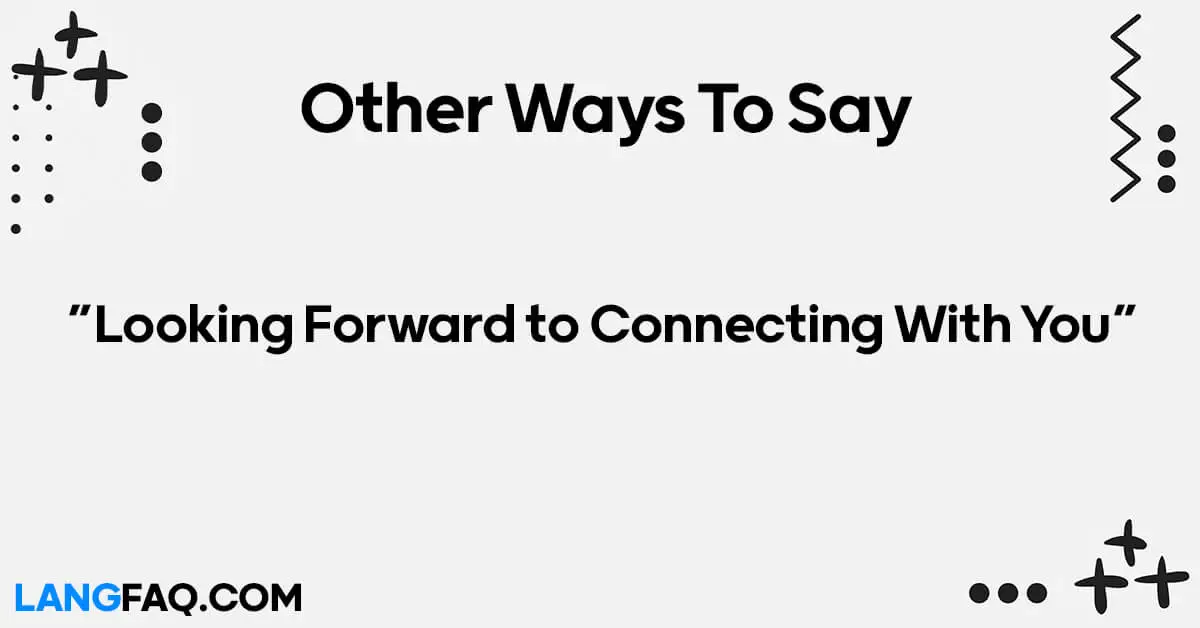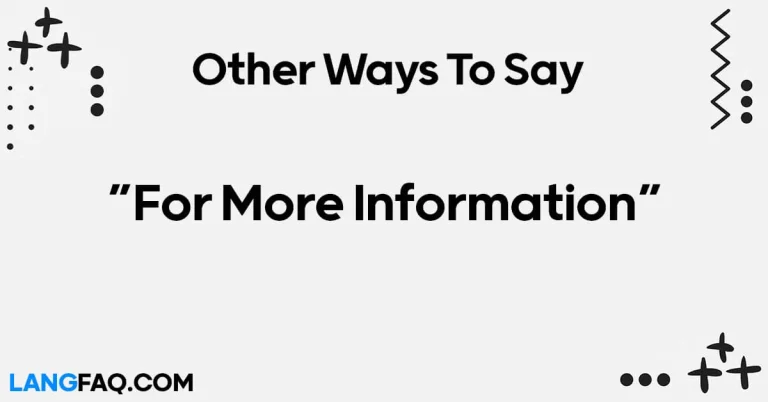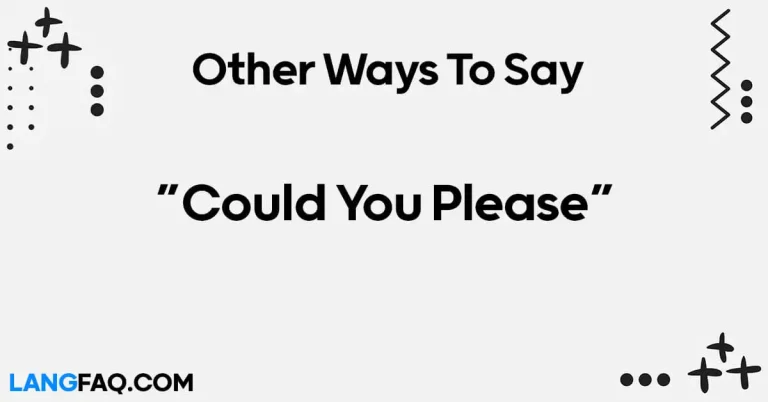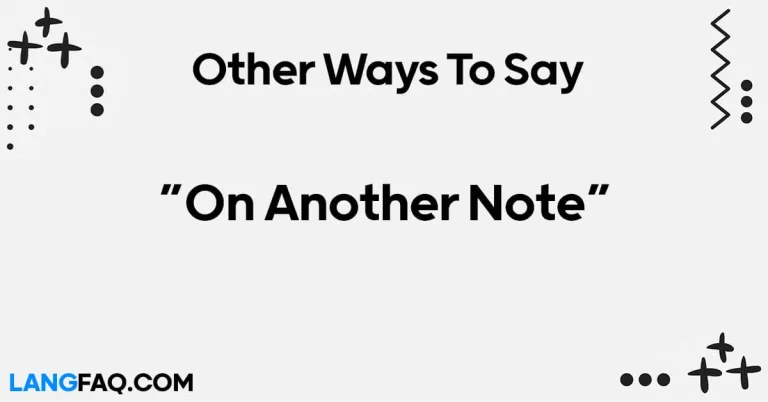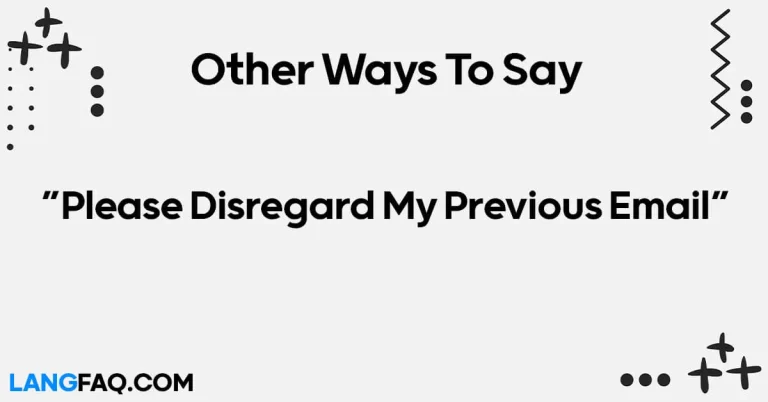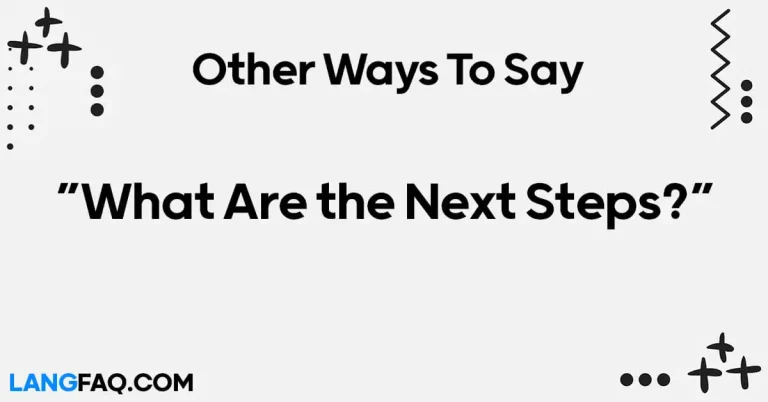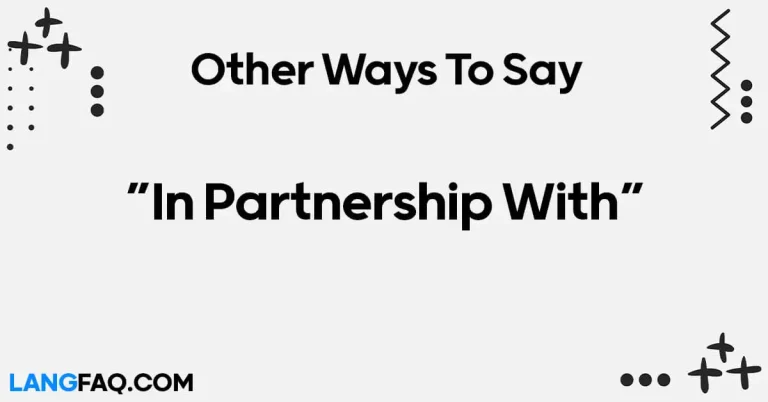In the realm of effective communication, expressing enthusiasm for future connections is vital. This article unveils 12 creative alternatives to the commonplace phrase “Looking Forward to Connecting With You,” ensuring your messages stand out. From professional settings to personal interactions, these alternatives add flair and diversity to your expressions.
12 Other Ways to Say “Looking Forward to Connecting With You”
Here are 12 other ways to express “Looking Forward to Connecting With You”:
- Eagerly anticipating our interaction.
- Excited about the upcoming connection.
- Enthusiastically awaiting our meeting.
- Anxiously looking forward to connecting.
- Keenly anticipating our collaboration.
- Can’t wait to engage with you.
- Anticipating our upcoming interaction.
- Thrilled about the prospect of connecting.
- Looking forward to our forthcoming meeting.
- Enthusiastically awaiting our communication.
- Counting down the moments until our connection.
- Awaiting the pleasure of our interaction.
Here’s a table with meanings and examples for the 12 other ways to say “Looking Forward to Connecting With You”:
| Expression | Meaning | Example |
|---|---|---|
| Eagerly anticipating our interaction | Excitedly looking forward to upcoming engagement | “I’m eagerly anticipating our business discussion.” |
| Excited about the upcoming connection | Full of enthusiasm for the upcoming interaction | “I’m so excited about the upcoming team meeting.” |
| Enthusiastically awaiting our meeting | Looking forward to the meeting with great eagerness | “I’m enthusiastically awaiting our client presentation.” |
| Anxiously looking forward to connecting | Eagerly and nervously anticipating the interaction | “I’m anxiously looking forward to our interview.” |
| Keenly anticipating our collaboration | Showing a strong interest in the upcoming collaboration | “I’m keenly anticipating our partnership discussions.” |
| Can’t wait to engage with you | Expressing eagerness and impatience for interaction | “I can’t wait to engage with you in our project.” |
| Anticipating our upcoming interaction | Expecting and looking forward to the upcoming meeting | “I’m anticipating our upcoming team-building event.” |
| Thrilled about the prospect of connecting | Excited and pleased about the possibility of interaction | “I’m thrilled about the prospect of connecting with new colleagues.” |
| Looking forward to our forthcoming meeting | Excited about the upcoming meeting or event | “I’m looking forward to our forthcoming client presentation.” |
| Enthusiastically awaiting our communication | Excitedly waiting for the upcoming communication | “I’m enthusiastically awaiting our response from the client.” |
| Counting down the moments until our connection | Expressing excitement and anticipation for the interaction | “I’m counting down the moments until our virtual meeting.” |
| Awaiting the pleasure of our interaction | Waiting with anticipation for the enjoyable interaction | “I’m awaiting the pleasure of our upcoming networking event.” |
These diverse expressions not only convey eagerness but also add depth and variety to your communication. Choosing the right phrase allows you to tailor your message to different contexts while maintaining a positive and engaging tone.
Is It Correct to Say “Looking Forward to Connecting With You”?
Absolutely, “Looking Forward to Connecting With You” is a correct and commonly used phrase in professional and formal communication. It conveys a positive and anticipatory tone, expressing eagerness to engage with the person you are addressing.
When to Use:
- Professional Settings: In business emails, networking events, or when corresponding with colleagues or clients, this phrase is appropriate to express a positive outlook toward future interactions.
- Job Interviews: It’s often used to conclude cover letters or express enthusiasm in job interviews, showcasing your anticipation for potential collaboration.
- Formal Correspondence: In any formal written communication, such as letters or official emails, it can be used to maintain a courteous and optimistic tone.
Example Sentences:
- “Thank you for considering my proposal. I am looking forward to connecting with you to discuss this further.”
- “I enjoyed our recent conversation and am looking forward to connecting with you again at the upcoming conference.”
- “I appreciate the opportunity for an interview. I am looking forward to connecting with you to discuss how my skills align with the role.”
Variations: While the phrase is versatile, you can use variations based on the level of formality or the nature of the relationship:
- “Looking forward to our conversation.”
- “Excited about the opportunity to connect.”
- “Anticipating our upcoming interaction.”
Pros:
- Positive Tone: It conveys positivity and enthusiasm.
- Versatility: Applicable in various professional and formal settings.
- Politeness: Adds a courteous touch to your communication.
Cons:
- Commonplace: As it is widely used, some might find it a bit generic. In such cases, using variations can add a unique touch.
Grammar/Usage Rules:
- Ensure correct grammar and punctuation for a polished effect.
- Use it in contexts where future communication or interaction is implied.
In conclusion, “Looking Forward to Connecting With You” is a courteous and widely accepted phrase suitable for various formal and professional settings. It’s a positive way to express eagerness for future engagement.
Professional Mail Example With “Looking Forward to Connecting With You”
Subject: Re: Project Collaboration Inquiry
Dear [Recipient’s Name],
I trust this email finds you well. My name is [Your Name], and I am writing to express my sincere appreciation for your interest in exploring a potential collaboration on our upcoming project.
Having thoroughly reviewed your impressive portfolio and understanding the depth of expertise your team brings to the table, we are genuinely excited about the possibility of working together. Your innovative approach aligns seamlessly with the vision we have for this project, and we believe that our collaboration could yield exceptional results.
I would like to propose a virtual meeting at your earliest convenience to discuss the project’s intricacies, your team’s capabilities, and how we can mutually contribute to its success. I believe this will provide an excellent opportunity for us to align our visions and explore potential synergies.
Could we schedule a Zoom call next week on [Proposed Date] at [Proposed Time]? Please let me know if this suits your schedule, and we can send you a calendar invitation promptly.
Looking forward to connecting with you and delving into the exciting prospects our collaboration could unfold.
Thank you for considering this opportunity, and I eagerly await your response.
Best regards,
[Your Full Name] [Your Position] [Your Company] [Your Contact Information]
Eagerly Anticipating Our Interaction
Expressing enthusiasm in professional communication is crucial for establishing a positive and engaging tone. When eagerly anticipating an interaction, you convey a sense of excitement that fosters a favorable atmosphere. This alternative is ideal for formal settings where maintaining professionalism is essential.
Example: Dialogue snippet: Colleague 1: “I’m eagerly anticipating our strategy meeting tomorrow. It’s a crucial step for the upcoming project.” Colleague 2: “Absolutely, the preparations have been extensive, and I share your enthusiasm.”
Email Sample:
Subject: Anticipation for Tomorrow’s Strategy Meeting
Dear [Colleague’s Name],
I trust this email finds you well. I am writing to express my eagerness in anticipation of our strategy meeting scheduled for tomorrow. The collaboration and dedication we’ve put into the preparations make me confident that it will be a productive session.
Best regards, [Your Name]
Variations:
- I’m eagerly awaiting our professional discussion.
- Looking forward to our collaborative effort tomorrow.
- Excited about our upcoming team-building event.
Dictionary Insight: Cambridge Dictionary defines “eagerly” as showing enthusiasm or interest, making it an appropriate word for conveying a positive outlook in professional communication.
Usage Tip: Use “eagerly” when you want to convey a high level of excitement and anticipation in a formal context. It adds a touch of enthusiasm without compromising professionalism.
Excited About the Upcoming Connection
Expressing excitement about a forthcoming connection adds a personal touch to your communication. This phrase is versatile, fitting both professional and informal scenarios. It’s especially effective when you want to convey genuine enthusiasm.
Example: Dialogue snippet: Friend 1: “I’m excited about the upcoming reunion. It’s been ages since we all met.” Friend 2: “Me too! The anticipation is making it even more special.”
Email Sample:
Subject: Excitement Building for Our Reunion
Hi [Friend’s Name],
I hope this email finds you in good spirits. I couldn’t help but share my excitement about our upcoming reunion. It’s been way too long, and the anticipation is making it all the more special. Can’t wait to catch up!
Warm regards, [Your Name]
Variations:
- I’m thrilled about our upcoming coffee catch-up.
- Excited about our scheduled video call.
- Looking forward to our informal get-together.
Dictionary Insight: “Excited” is defined as having strong, pleasant emotions, making it an ideal word for expressing enthusiasm in various contexts.
Usage Tip: Employ “excited” when you want to convey a heightened level of positive emotions. It’s suitable for both professional and personal settings, adding a touch of warmth to your message.
Enthusiastically Awaiting Our Meeting
Conveying enthusiasm with the phrase “Enthusiastically Awaiting Our Meeting” adds energy to your communication. This alternative is effective in professional contexts, emphasizing your eagerness while maintaining a polished tone.
Example: Dialogue snippet: Client: “I appreciate your enthusiasm for our upcoming presentation.” You: “Thank you! I’m enthusiastically awaiting our meeting to discuss the details.”
Email Sample:
Subject: Enthusiastic Anticipation for Our Meeting
Dear [Client’s Name],
I trust this email finds you well. I wanted to express my enthusiasm for our upcoming meeting to discuss the project details. I’m eagerly looking forward to our collaboration and believe this discussion will be instrumental in our success.
Best regards, [Your Name]
Variations:
- Enthusiastically anticipating our collaboration.
- Thrilled about our scheduled discussion.
- Excitedly awaiting our formal meeting.
Dictionary Insight: The term “enthusiastically” is defined as showing intense and eager enjoyment, making it an appropriate choice for expressing genuine excitement in professional settings.
Usage Tip: Use “enthusiastically” when you want to convey not just excitement but a deep sense of enjoyment and eagerness. It’s suitable for professional contexts where maintaining a positive yet refined tone is crucial.
Anxiously Looking Forward to Connecting
Adding a touch of intensity, the phrase “Anxiously Looking Forward to Connecting” conveys eagerness with a sense of urgency. This alternative is versatile, fitting both professional and personal contexts where a more dramatic flair is welcome.
Example: Dialogue snippet: Friend 1: “I can’t wait for the surprise! Are you excited?” You: “Absolutely! I’m anxiously looking forward to connecting and hearing all about it.”
Email Sample:
Subject: Anxious Anticipation for Our Virtual Meetup
Hi [Friend’s Name],
The anticipation for our virtual meetup is building up, and I must say, I’m anxiously looking forward to connecting and catching up on all the exciting news. Can’t wait!
Warm regards, [Your Name]
Variations:
- Anxiously awaiting our scheduled call.
- Eagerly looking forward to our upcoming chat.
- Excitedly anticipating our connection.
Dictionary Insight: “Anxiously” conveys a sense of uneasiness mixed with anticipation, adding a layer of intensity to the expression of excitement.
Usage Tip: Use “anxiously” when you want to convey a heightened sense of anticipation, especially in situations where a touch of drama is suitable. It’s effective in both professional and personal contexts, depending on the tone you wish to set.
Keenly Anticipating Our Collaboration
When expressing eagerness in a more formal context, “Keenly Anticipating Our Collaboration” is an excellent choice. This phrase conveys a strong interest and commitment to the upcoming collaborative efforts, making it suitable for professional environments.
Example: Dialogue snippet: Colleague 1: “The upcoming project requires strong collaboration. Are you ready for it?” Colleague 2: “Absolutely! I’m keenly anticipating our collaboration and confident it will lead to success.”
Email Sample:
Subject: Keen Anticipation for Our Collaborative Endeavor
Dear [Colleague’s Name],
I hope this email finds you well. I wanted to express my excitement and keen anticipation for our upcoming collaboration on the project. Your expertise and dedication are qualities I value, and I’m confident our joint efforts will yield excellent results.
Best regards, [Your Name]
Variations:
- Keenly looking forward to our joint project.
- Excited about our collaborative initiative.
- Eagerly anticipating our teamwork.
Dictionary Insight: “Keenly” denotes a strong interest or enthusiasm, making it a precise choice when emphasizing genuine excitement in a professional context.
Usage Tip: Choose “keenly” when you want to highlight not just excitement but a strong interest in the collaboration. It adds a level of commitment and dedication to the expression.
Can’t Wait to Engage With You
Injecting informality into your communication, “Can’t Wait to Engage With You” strikes a balance between professionalism and warmth. This alternative is versatile, suitable for both professional and personal settings.
Example: Dialogue snippet: Client: “Looking forward to our presentation next week.” You: “Absolutely! Can’t wait to engage with you and discuss how we can exceed your expectations.”
Email Sample:
Subject: Anticipation for Our Upcoming Presentation
Dear [Client’s Name],
I appreciate your message and am thrilled about our upcoming presentation. Can’t wait to engage with you and delve into the details. Your insights are invaluable, and I’m eager to ensure we meet and exceed your expectations.
Best regards, [Your Name]
Variations:
- Can’t wait to connect with you.
- Excited about our upcoming interaction.
- Looking forward to engaging with you.
Dictionary Insight: The phrase “can’t wait” expresses impatience and eagerness, making it an effective choice for informal yet positive communication.
Usage Tip: Use “can’t wait” when you want to inject informality and warmth into your expression. It’s versatile and works well in various contexts, fostering a friendly and approachable tone.
Anticipating Our Upcoming Interaction
For a well-rounded and versatile expression of excitement, “Anticipating Our Upcoming Interaction” is a suitable choice. This phrase strikes a balance between formality and warmth, making it applicable in various professional and personal scenarios.
Example: Dialogue snippet: Friend 1: “Our virtual book club is tomorrow! Are you excited?” You: “Absolutely! I’ve been anticipating our upcoming interaction and the lively discussions.”
Email Sample:
Subject: Anticipation for Tomorrow’s Virtual Book Club
Hi [Friend’s Name],
I hope this email finds you well. I’ve been anticipating our upcoming interaction at the virtual book club tomorrow. The thought-provoking discussions and camaraderie make it a highlight of my week. Can’t wait!
Warm regards, [Your Name]
Variations:
- Anticipating our scheduled conversation.
- Excited about our upcoming interaction.
- Looking forward to our planned meeting.
Dictionary Insight: “Anticipating” conveys a sense of expectation and readiness, making it an apt choice for expressing excitement in various contexts.
Usage Tip: Choose “anticipating” when you want to convey a sense of readiness and expectation. It works well in both professional and personal settings, adding a touch of formality to your expression.
Thrilled About the Prospect of Connecting
To express not just excitement but a genuine thrill, “Thrilled About the Prospect of Connecting” is a dynamic choice. This phrase is particularly effective in situations where you want to convey heightened enthusiasm and anticipation.
Example: Dialogue snippet: Colleague 1: “The networking event is next week. How do you feel about it?” Colleague 2: “I’m thrilled about the prospect of connecting with industry leaders and expanding our network.”
Email Sample:
Subject: Thrilled Anticipation for the Upcoming Networking Event
Dear [Colleague’s Name],
I trust this email finds you well. I wanted to share my excitement and thrill about the prospect of connecting with industry leaders at the upcoming networking event. The possibilities for collaboration are truly thrilling.
Best regards, [Your Name]
Variations:
- Thrilled about our scheduled discussion.
- Excitedly awaiting the prospect of connecting.
- Looking forward to the thrilling opportunity to connect.
Dictionary Insight: “Thrilled” denotes a strong and exhilarating excitement, making it a powerful word choice for expressing heightened enthusiasm.
Usage Tip: Use “thrilled” when you want to convey an intense and exhilarating level of excitement. It’s suitable for professional contexts where you want to express strong anticipation.
Looking Forward to Our Future Collaboration
In a professional setting, emphasizing collaboration is essential. “Looking Forward to Our Future Collaboration” adds a formal touch while expressing anticipation. This phrase is ideal for situations where joint efforts and cooperation are key.
Example: Dialogue snippet: Client: “Your proposal looks promising. What are your thoughts on future collaboration?” You: “I’m genuinely looking forward to our future collaboration and believe it holds great potential for mutual success.”
Email Sample:
Subject: Anticipation for Future Collaborative Endeavors
Dear [Client’s Name],
Thank you for considering our proposal. I’m delighted at the prospect and am genuinely looking forward to our future collaboration. I believe our joint efforts will lead to mutual success.
Best regards, [Your Name]
Variations:
- Looking forward to our collaborative partnership.
- Excited about our upcoming joint venture.
- Eagerly awaiting our future collaboration.
Dictionary Insight: “Collaboration” signifies working together, making this phrase an apt choice for expressing anticipation in professional contexts.
Usage Tip: Choose “future collaboration” when you want to highlight a long-term commitment and joint effort. It’s suitable for professional relationships where sustained collaboration is anticipated.
Excitedly Looking Forward to Our Future Interactions
For a more dynamic expression that conveys ongoing excitement, “Excitedly Looking Forward to Our Future Interactions” is fitting. This phrase is versatile, suitable for professional and personal relationships where continued engagement is expected.
Example: Dialogue snippet: Friend 1: “I hope this is just the beginning of our new friendship.” You: “Absolutely! I’m excitedly looking forward to our future interactions and building many more memories together.”
Email Sample:
Subject: Excitement for Our Evolving Friendship
Hi [Friend’s Name],
I trust this message finds you well. I’m excitedly looking forward to our future interactions and the opportunity to build many more memories together. Our evolving friendship is truly special.
Warm regards, [Your Name]
Variations:
- Excited about our ongoing interactions.
- Looking forward to the prospect of future connections.
- Eagerly anticipating our continuous engagement.
Dictionary Insight: “Excitedly” adds an extra layer of vivacity, perfectly complementing the anticipation conveyed by “looking forward to our future interactions.”
Usage Tip: Use “excitedly” when you want to express ongoing enthusiasm for future interactions. It’s versatile and suitable for both professional and personal relationships, adding a vibrant touch to your expression.
Enthusiastically Awaiting Your Reply
Maintaining an upbeat tone in written communication is essential, especially when awaiting a response. “Enthusiastically Awaiting Your Reply” conveys eagerness in a positive light. This phrase is versatile, suitable for both professional and personal communication.
Example: Dialogue snippet: Colleague 1: “I’ve sent you the details for review. What are your thoughts?” Colleague 2: “Thank you for sharing. I’m enthusiastically awaiting your reply and eager to discuss any feedback.”
Email Sample:
Subject: Enthusiastic Anticipation for Your Feedback
Dear [Colleague’s Name],
I trust this email finds you well. I’ve shared the details for your review and am enthusiastically awaiting your reply. Your feedback is valuable, and I’m eager to discuss any thoughts or suggestions you may have.
Best regards, [Your Name]
Variations:
- Enthusiastically looking forward to your response.
- Excited about hearing back from you.
- Eagerly awaiting your reply.
Dictionary Insight: “Enthusiastically” communicates a sense of eagerness and energy, making it an ideal choice for expressing positive anticipation.
Usage Tip: Choose “enthusiastically” when you want to convey genuine excitement in anticipation of a reply. It adds a positive and energetic touch to your communication.
Eagerly Counting Down to Our Connection
Adding a playful twist to your expression, “Eagerly Counting Down to Our Connection” injects a sense of liveliness. This phrase is suitable for both professional and personal settings where a touch of informality is welcomed.
Example: Dialogue snippet: Friend 1: “Our vacation is just a week away! How excited are you?” You: “I’m eagerly counting down to our connection and the adventures awaiting us!”
Email Sample:
Subject: Countdown to Our Awaited Getaway
Hi [Friend’s Name],
I hope this email finds you well. I couldn’t help but share my excitement—I’m eagerly counting down to our connection during the upcoming vacation. The anticipation is building, and I can’t wait for the adventures we’ll embark on together.
Warm regards, [Your Name]
Variations:
- Eagerly anticipating our upcoming meetup.
- Excited about counting down to our connection.
- Looking forward to our awaited rendezvous.
Dictionary Insight: The phrase “counting down” creates a sense of anticipation and excitement, making it suitable for expressing the waiting period leading up to an event.
Usage Tip: Use “eagerly counting down” when you want to add a playful element to your expression. It’s effective in both professional and personal contexts, especially when looking forward to an event or meeting.
FAQs
Q: Can I use these alternatives in professional emails? Certainly! Many of these alternatives are versatile and can be applied in professional settings to convey eagerness and maintain a polished tone.
Q: Are these alternatives suitable for casual conversations? Absolutely! Depending on the level of formality you desire, you can choose alternatives that range from formal to informal, ensuring adaptability for various situations.
Q: How do I decide which alternative to use? Consider the context and your relationship with the recipient. For professional settings, opt for alternatives that maintain a level of formality, while in personal connections, feel free to inject more warmth and informality.
Q: Can I use these alternatives in written correspondence only? No, these alternatives can be applied in verbal communication as well. Tailor your choice based on the tone and setting of the conversation.
Q: Do these alternatives work in languages other than English? While the nuances may vary, the essence of expressing anticipation remains universal. Feel free to adapt these alternatives for various languages.
Q: Can these alternatives be used in business negotiations? Certainly! Choosing the right alternative can add a positive touch to your negotiations, fostering a collaborative atmosphere.
Conclusion
Diversify your communication toolkit with these 12 alternatives, elevating your expressions of anticipation. Whether in professional emails, personal messages, or business negotiations, finding the right phrase enhances your connection-building efforts. Use these alternatives judiciously to infuse your communication with genuine enthusiasm and positivity.

